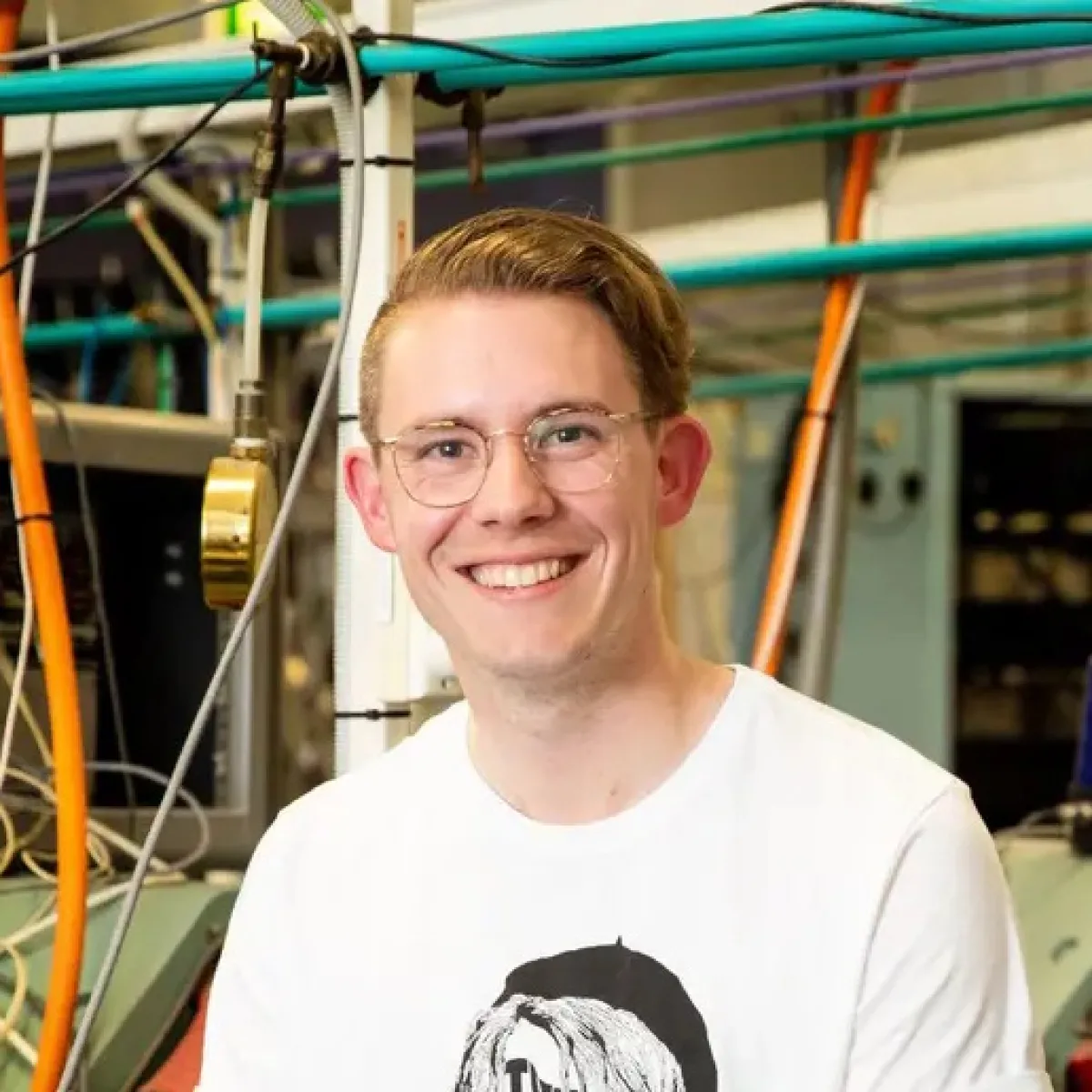
Nuclear study options
Knowledge of nuclear science is increasingly important across diverse fields, from pure scientific endeavours through to health, medical physics, industrial processes, mining, security, defence and policy development.
Why study Nuclear Science or Nuclear Systems
Nuclear science is an evolving field with applications across medical physics, mining, defence, security, policy, and traditional physics.
Our research-led teaching spans undergraduate and postgraduate levels, covering all aspects of nuclear science, including reactor science, nuclear fuel cycles, and ensuring policy debates on nuclear issues are informed by science and best practices.
ANU leads the nation’s premier nuclear physics research and training program, playing a key role in advancing the nation’s sovereign nuclear capabilities. It is also home to the Heavy Ion Accelerator Facility (HIAF) (pictured above), the largest facility of its kind in the Southern Hemisphere. HIAF hosts Australia’s only experimental nuclear physics program and features one of the world’s highest-voltage accelerators, capable of generating 15 million volts. There are multiple ways to incorporate nuclear engineering competencies into your studies at any level.
Key facts
#1 for Natural Sciences (QS 2024) and Physics and Astronomy (QS 2024) in Australia
#1 in Australia for graduate employability (Times Higher Education)
6 Noble laureates among our staff and alumni
5 star rating for staff-to-student ratio (Good Universities Guide)
$240 million science precinct with state-of-the-art facilities
Study options
Undergraduate
Bachelor of Science (Advanced) (Honours)
with Nuclear Science minor
4 years full-time
Honours Pathway Options
Bachelor of Philosophy (Honours) - Science
4 years full-time
Research focussed
One-on-one mentoring
Bachelor of Engineering (Honours)
with Nuclear Systems major and minor
4 years full-time
Accredited with Engineers Australia
Work Integrated Learning
Bachelor of Engineering (Research and Development) (Honours)
with Nuclear Systems major and minor
4 years full-time
Accredited with Engineers Australia
Work Integrated Learning & Research and Development projects
Postgraduate coursework
Master of Science in Nuclear Science
Advanced option available
2 years full-time
Only university in Australia offering postgraduate Nuclear Science study
Graduate Certificate of Nuclear Science and Technology
Study the fundamentals of nuclear science and its applications
6 months full-time (if commencing in semester 1)
In-person delivery
Pathway to master degrees
Graduate Certificate of Nuclear Security and Safeguards
Co-designed with the Australian Safeguards and Non-Proliferation Office (ASNO)
6 months full-time (if commencing in semester 1)
In-person or off campus delivery
Pathway to master degrees
Graduate Certificate of Nuclear Technology Regulation
For professionals with and without a technical background who work with regulatory stakeholders
6 months full-time (if commencing in semester 1)
In-person delivery
Pathway to master degrees
Postgraduate research
Bespoke training
ANU has extensive experience delivering tailored professional courses in nuclear science, technology, and policy to Australian Government departments, including Industry, Defence, and Foreign Affairs and Trade.

PhD candidate - Nuclear Physics
Graduate - Master of Science (Advanced) in Nuclear Science
“At ANU, we do very different research, and I feel like we’re the only place in the world where you can do some of those things.”

Graduate - Master of Nuclear Science
“The Master degree in nuclear science was fantastic and catered to students from all backgrounds, whether they’re professionals like me, or from government departments, or they want to be a nuclear physicist. It covers the whole spectrum from practical expertise to pure theory.”

PhD Student - Nuclear Physics & Accelerator Applications
“Sometimes I see something on screen, and it is the first time anyone has noticed that. Even if it is a very tiny thing in the whole field, still it is exciting to be doing something of my own.”
Career pathways
Domestic students
The job market for nuclear workers in Australia has traditionally been small. This is primarily because Australia does not have a civilian nuclear energy industry. The work we do with nuclear technologies is therefore diverse and tends to attract people from a range of fields who often train on the job.
Considerable growth is happening now, primarily as a result of AUKUS, but roles are cropping up across all of the nuclear agencies (government - Australian Nuclear Science and Technology Organisation (ANSTO), Australian Safeguards and Non-proliferation Office (ASNO), Australian Radiation Protection and Nuclear Safety Agency (ARPANSA), Australian Radioactive Waste Agency (ARWA), Australian Submarine Agency (ASA), and now the Australian Nuclear-Powered Submarine Safety Regulator (ANPSSR)) and in industry (primarily Defence-related consulting) because nuclear expertise is hard to find in this country. This is in fact why we stood up this program - industry and government demand for students with this expertise is growing, and presents a market for such skills.
Some areas are likely to offer more opportunities than others, particularly if you are hoping to stay in Canberra. Locally, most relevant opportunities are in ASNO, ASA, Defence, consulting (e.g. KBR, Nova Systems, AECOM) and tertiary educational institutions. Beyond Canberra, Sydney is the next closest hub of activity for nuclear workers because of its proximity to ANSTO (the location of Australia's only research reactor, and producer of most of Australia's medical isotope needs). Beyond Australia, there are often roles in the IAEA or CTBTO that are worth exploring.
In all cases, on-the-job training is an essential part of your career pathway - and it may take up to a decade before you are seen as fully qualified. Further formal study may also be recommended or required.
International students
International students wishing to find opportunities in Australia should be aware that many jobs in nuclear in Australia require Australian citizenship. Australia-based roles in industry (e.g. mining, medical devices, research) may not have such requirements - but these opportunities are limited in number and are likely to require relocation.
If you wish to use your nuclear skills to pursue a career abroad, it's important to be aware of the fact that we cannot provide advice on the job market for nuclear workers for all countries. We can tell you that the nuclear industry world-wide is growing and there is a global shortage of workers for any roles related to nuclear, so demonstrated interest and work in sectors that have a similar “safety-critical” profile are helpful.
In all cases, on-the-job training is an essential part of your career pathway - and it may take up to a decade before you are seen as fully qualified (again, depending on local requirements). Further formal study may also be recommended or required.
If you are looking for opportunities that will help you develop towards a career in nuclear, we recommend the following:
- Seek out research opportunities that develop skills relevant to nuclear (e.g. there is at least one nuclear-related capstone project per year, and there are honours or R&D opportunities) - we can help you find opportunities that are not restricted to Australian citizens.
- Work on identifying work placements or internships early - and seek out settings where citizenship requirements are not as stringent but safety is paramount. These will help you develop skills that are important for work in the nuclear industry.
- See if there's a network for nuclear professionals in the country you hope to live in, and ask for advice on career pathways. This will help you choose electives and opportunities that will strategically build your CV.
Internationally, there are often roles in the IAEA or CTBTO that are worth exploring.
